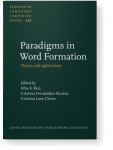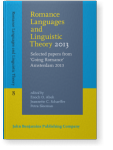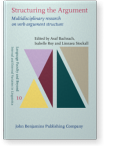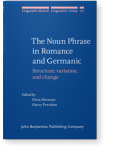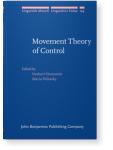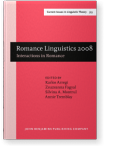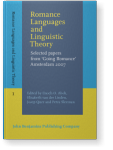Gianina Iordachioaia
List of John Benjamins publications for which Gianina Iordachioaia plays a role.
2022 Chapter 7. Paradigmatic aspects of deverbal noun conversion in English Paradigms in Word Formation: Theory and applications, Ruz, Alba E., Cristina Fernández-Alcaina and Cristina Lara-Clares (eds.), pp. 155–180 | Chapter
In this paper, I seek to identify some recurrent and predictable patterns in the formation of deverbal converted nouns in English (to climb > the climb), which crucially differ from denominal conversion verbs (the bottle > to bottle) in showing only limited productivity. I will argue, however,… read more
2019 Chapter 6. The development of gender and countability effects in German ung- and English ing-nominals Historical Linguistics 2015: Selected papers from the 22nd International Conference on Historical Linguistics, Naples, 27-31 July 2015, Cennamo, Michela and Claudia Fabrizio (eds.), pp. 115–132 | Chapter
Although German ung- and English ing-nouns developed from a common Germanic origin, the two nominalization types exhibit surprisingly different aspectual and countability properties in present-day German and present-day English. Diachronically, one of the most prominent differences between the two… read more
2015 Deverbal nominalization with the ‘Down’-operator Romance Languages and Linguistic Theory 2013: Selected papers from 'Going Romance' Amsterdam 2013, Aboh, Enoch O., Jeannette Schaeffer and Petra Sleeman (eds.), pp. 223–238 | Article
We argue that the nominal supine in Romanian is a nominalization by the definite determiner in its interpretation as a ‘Down’-operator, which correlates with an event-kind denotation. We use as evidence the restricted nominal properties of the nominal supine, which indicate that it does not have a… read more
2014 Causative nominalizations: Implications for the structure of psych verbs Structuring the Argument: Multidisciplinary research on verb argument structure, Bachrach, Asaf, Isabelle Roy and Linnaea Stockall (eds.), pp. 119–137 | Article
We investigate so-called causative psych nominalizations (CPNs), i.e., nominalizations of object experiencer (OE) verbs that realize non-agentive causers as external arguments. While they are ruled out in English (Grimshaw 1990; Iwata 1995; Pesetsky 1995) and have been suggested to be… read more
2011 Scaling the variation in Romance and Germanic nominalizations The Noun Phrase in Romance and Germanic: Structure, variation, and change, Sleeman, Petra and Harry Perridon (eds.), pp. 25–40 | Article
We investigate the distribution of verbal and nominal layers in Romance and Germanic nominalizations. Specifically, we examine pairs of ‘verbal’ vs. ‘nominal’ nominalizations in two Romance (Spanish & Romanian) and two Germanic (English & German) languages. Our study proposes a large spectrum of… read more
2010 No objections to Backward Control Movement Theory of Control, Hornstein, Norbert and Maria Polinsky (eds.), pp. 89–118 | Article
This chapter addresses two main counterarguments put forth in Landau (2007) against the movement analysis of Control, and especially against the phenomenon of Backward Control (BC), as proposed for Tsez by Polinsky & Potsdam (2002). The first objection concerns the Case properties of the subject… read more
2010 Syntactic realizations of plural in Romance and Germanic nominalizations Romance Linguistics 2008: Interactions in Romance, Arregi, Karlos, Zsuzsanna Fagyal, Silvina Montrul and Annie Tremblay (eds.), pp. 107–124 | Article
This paper offers a syntactic account for the various ways in which Plural is expressed within Argument-Supporting Nominals (ASNs) in Romance and Germanic. We first show, starting from Romanian data, that pluralization is connected to aspectual properties like (a)telicity and (un)boundedness. These… read more
2009 Structural patterns blocking plural in Romance nominalizations Romance Languages and Linguistic Theory: Selected papers from ‘Going Romance’ Amsterdam 2007, Aboh, Enoch O., Elisabeth van der Linden, Josep Quer and Petra Sleeman (eds.), pp. 145–160 | Article
Some Complex Event Nominals (CENs) like the Romanian infinitive contradict the generalization in Grimshaw (1990) according to which CENs do not pluralize. But many CENs like the Romanian supine and the Spanish nominal infinitive obey this generalization. In this paper we explain the availability… read more
